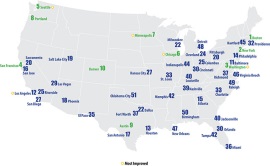by Brianna Crandall — May 27, 2015—Mayors and local lawmakers in America’s largest cities continue to take innovative steps to lower energy costs for consumers and businesses, increase their resilience, and reduce pollution through increased energy efficiency, according to the 2nd edition of the City Energy Efficiency Scorecard, released last week by the American Council for an Energy-Efficient Economy (ACEEE). ACEEE hopes local leaders from cities of all sizes can learn best practices from each other through the Scorecard.
 The cities in green are the top U.S. cities for energy efficiency, and the cities marked with stars are the most improved.
The cities in green are the top U.S. cities for energy efficiency, and the cities marked with stars are the most improved.(Click on image to enlarge)
The ACEEE report finds that Boston continues to be the most energy-efficient city in the nation, receiving 82 out of a possible 100 points, an improvement of more than five points from that city’s 2013 score. Trailing Boston, the top 10 U.S. cities for energy efficiency are: New York City (#2), Washington, DC (#3), San Francisco (#4), Seattle (#5), Chicago (#6), Minneapolis (#7), Portland (#8), Austin (#9), and Denver (#10). With 9 of the top 10 cities improving their scores from 2013, Boston faced increased competition for the top spot, notes ACEEE.
Key findings in the 2015 City Energy Efficiency Scorecard include the following:
- Washington, Los Angeles, Chicago, Minneapolis, and Seattle are the most improved cities compared to the 2013 City Scorecard, with many showing double-digit improvements in their scores. Los Angeles, for example, established a strong energy savings goal, and Chicago enacted a new commercial building benchmarking ordinance.
- Other cities have also improved their scores since the last edition, including several in the southeastern United States. Atlanta, the leading city in the Southeast, saw an improvement of five points, earning new points for local government operations, buildings policies, energy and water utilities, and transportation policies. Charlotte made a strong showing as well, improving by nearly eight points. Jacksonville, the lowest scoring city in the 2013 edition, saw a 50 percent increase in its score.
- All of the ranked cities, even the highest scorers, have significant room for improvement. Boston was the only city to earn over 80 points, and only 13 cities earned more than half of the possible points.
In the five key areas covered by the report, the key findings are:
- Government operations: Leaders in efficiency in local government operations are Denver, New York City, and Phoenix, all of which have set policies to increase efficiency in city government, procurement, and asset management.
- Community initiatives: The top-scoring cities in community-wide initiatives are New York City and Boston. They both have systems to track progress toward efficiency-related goals for the whole community, and strategies to mitigate urban heat islands. They also have efficient distributed-energy systems, such as district energy and combined heat and power, and policies or programs to plan for future ones.
- Buildings: Leading cities in buildings policies include Boston, New York City, and Washington. These cities have adopted or advocated for stringent building energy codes, devoted resources to building code compliance, established requirements and incentives for efficient buildings, and increased the availability of information on energy use in buildings through benchmarking and transparency policies. Residents and business owners can also access programs that take a systemic, building-wide approach to retrofits and upgrades.
- Utilities: The leading cities in the energy utilities area are Boston, San Francisco, Portland, Minneapolis, and Chicago. Their energy efficiency programs offer high levels of savings. These cities also have productive relationships with their utilities in program implementation and access to energy data. Boston, San Francisco, Seattle, New York City, Los Angeles, Austin, Atlanta, Fort Worth, and El Paso are the leading cities in tackling efficiency in their water systems.
- Transportation: Cities with the top transportation policy scores include Portland, Washington, Boston, and Seattle. Their initiatives include location-efficiency strategies, shifts to efficient modes of transportation, transit investments, efficient vehicles and vehicle infrastructure, and energy-efficient freight transport.
Methodology
ACEEE’s 2015 City Energy Efficiency Scorecard documents and compares actions cities can take to enable or improve energy efficiency. The report’s metrics are based on policy actions local governments can implement or influence and attempt to reflect the policy activity cities are taking. For the purposes of the Scorecard, ACEEE defines cities as the area within the political borders where a local government has direct policy authority. ACEEE included 51 cities in this edition of the Scorecard, up 17 from the 2013 edition of the report.
The report’s metrics measure policies and programs that achieve one or more of the following: directly reduce end-use energy consumption; accelerate the adoption of the most energy-efficient technologies; provide funding for energy efficiency programs; set long-term commitments to energy efficiency; establish or enforce building performance codes or standards; and reduce market, regulatory, and information barriers to energy efficiency. All policy metrics analyzed are related to one of five policy areas identified above.





